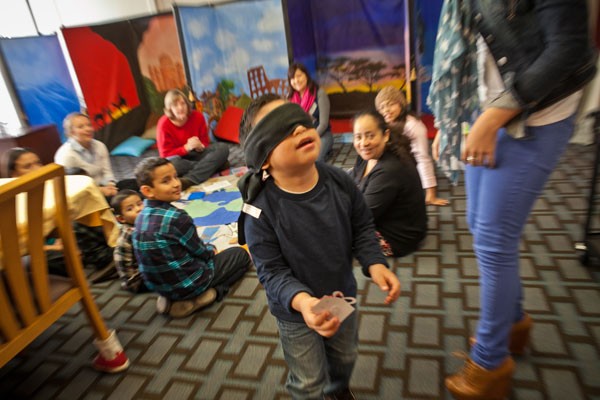Grant trains teachers who understand hearing loss
Deaf education program wins $1.2 million grant

Josue Alva plays a game of Pin the Ornament on the Christmas Tree that builds vocabulary and tests his reactions to spoken cues.
Photo: Brian StethemJeff Westendorf has early memories of feeling "wiped out" by speech therapy. His 12-hour days as a preschooler who wore hearing aids started with flash cards before the morning bus arrived, and ended with him falling asleep in front of "The A-Team."
He was struggling to talk, and it paid off. By age 5 or 6 he was speaking, and today he sounds like the graduate student he is.
"A lot of people said there were things I couldn't do, and I did them. I played sports all through high school," said Westendorf, who is working toward a CLU teaching credential and master's degree in education for the deaf and hard of hearing.
With early screening and diagnosis, cochlear implants for profoundly deaf children, better hearing aids and more effective teaching methods, children with hearing loss are having unprecedented success in general education settings.
To meet the needs of its fast-growing deaf and hard-of-hearing populations, however, California needs more specialized teachers. And this school year, the CLU Graduate School of Education's efforts to remedy the shortage received a major boost in the form of a $1.2 million Education Department grant.
Eighty percent of the federal money goes toward tuition and books in the two-year program, covering the better part of Westendorf's master's degree and those of 11 other currently enrolled teacher candidates. In all, the grant will allow CLU to prepare 48 specialists to teach students from birth to age 22 and to advise general classroom teachers. Based at CLU's Woodland Hills Center, the program is the only one in California that prepares educators to teach listening and spoken language to students older than age 6.
Going forward, the money will help with recruiting. But for those teacher candidates who started last summer, the tuition aid came as a late, very welcome surprise.
"It's a great relief," said Westendorf. "Now I can just focus on my program and class and homework."
Teacher candidates arrive at CLU with varied experiences and strengths, notably skills in sign language and Spanish. More than half of Californians diagnosed with hearing loss live in homes where Spanish is spoken.
"I really feel like I've found a good niche to use my Spanish-speaking abilities for something good," said Jessica Lopez, who had her eyes opened to new possibilities when she taught English to children with hearing loss on her year abroad in Madrid.
Although the teacher candidates must learn to sign, CLU's program relies on young students' listening abilities for making progress in acquiring language.
"Hearing, but also listening. They really have to attend to sound," explained program director Maura Martindale, who has more than 30 years of teaching experience and is the chair of CLU's Special Education Department. "Spoken language is learned through audition, and that's the best, fastest way to do it. We've tried for centuries to do it all kinds of other ways."
Cynthia Hernandez, M.S. '11, first learned about the field through L.A.'s John Tracy Clinic, where she now works.
"I was fascinated to think that children with hearing loss could actually learn to listen and to speak," she said. "Whenever you think children with hearing loss, it's everyone's assumption that you think sign language."
Hernandez remains involved with the CLU program as a field supervisor at No Limits for Deaf Children, a Culver City-based nonprofit. CLU teacher candidates get teaching experience at the school, designing and executing lessons for students in grades K-6.
One Saturday last semester, teacher candidates Jeannine Blankenship and Jane Hankins were leading three boys and their families in games under Hernandez's supervision. Josue Alva's eyes brightened as he tried to guess what was inside of the gift boxes that he and his mother were shaking.
The lessons are for parents as much as anyone; 92 percent of deaf and hard-of-hearing kids are born to two hearing parents.
"Sometimes parents just don't know what to do. They've never seen anybody who's deaf," Martindale said.
"You have to up the stimulation," she added. "You can't just talk the way you ordinarily would have talked to your kid. You have to crank it up, so you're really pouring in language and expecting the children to use language and so that their speech sounds as intelligible as possible."
When Westendorf had his first teaching experience last semester, at a West Hollywood elementary school, parents peppered him with questions about hearing loss and how far their kids could progress.
"Do you drive?" asked one Spanish-speaking parent through a translator. The question surprised Westendorf, who went away to Denver for college to learn independence.
"I said, 'Of course. I drive.' And they asked how I could hear the ambulances and the fire trucks. I said, 'I don't. I have the music blaring.' They got a good laugh out of that."
After class at No Limits, Lizeth Pacheco said that free instruction for her two sons with cochlear implants has shown her how to be a teacher for them.
"It helps me to help," she explained in Spanish.